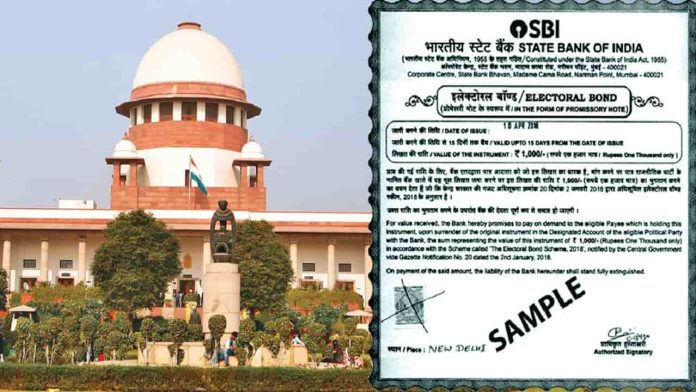The second day of hearing in the Electoral Bonds case witnessed the Supreme Court questioning whether the scheme legalised ‘kickbacks’ to political parties, to which Solicitor General Tushar Mehta replied that a certain element of confidentiality was necessary.
The Constitution Bench comprising Chief Justice of India D.Y. Chandrachud, Justice Sanjiv Khanna, Justice B.R. Gavai, Justice J.B. Pardiwala and Justice Manoj Misra further discussed whether the bonds were actually confidential or merely ‘selectively’ anonymous.
The SG contended that the donations made through the bonds had to be confidential, in order to protect the donor from victimisation and retribution they may face from a political party if the affiliation with another opposing party was made public.
The fear of retribution may also push the donors to donate through cash, converting white money into black money, if the donations made through electoral bonds were not kept confidential, he pointed out.
The CJI then remarked that in the effort of bringing white money in the process, essentially, may lead to providing a complete information hole. Noting that the motive may be laudable, the CJI asked whether the means adopted were proportional or not.
SG Mehta requested the Apex Court not to use terms such as ‘anonymity’ and ‘opacity’ to describe the Electoral Bonds Scheme, stating that the scheme only ensured a certain amount of ‘confidentiality,’ which could be opened by judicial direction.
The Apex Court sought to know whether the scheme legalised illegal payments intended as compensation for favourable treatment from political parties.
The Bench said in the earlier scheme, if a candidate from the party collected Rs 50 crore, he would not deposit the entire amount in the coffers of the party. He would have his share in that. Under this scheme, the amount would go directly to the party, not to the individual. The party may get it as opposed to the individual. There would be no way to know whether this was legalising the motive for the inflow of funds.
The Counsel representing the Central government said that if this scheme did not come, if a person had to pay kickback, he would pay the kickback by way of cash. Even considering the case to be a worst case, the amount would now come in white money in channels.
The Bench suggested that in order to ensure that people were not victimised and to have a level playing field, all the donations should be given to the Election Commission of India, which would then distribute the same on an equitable basis.
The SG said that in such a scenario, everything would come by cash.
(Case title: Association For Democratic Reforms And Anr vs Union Of India And Ors)


